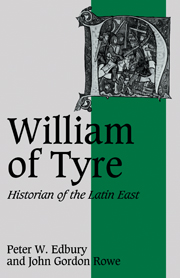Book contents
- Frontmatter
- Contents
- Preface
- Abbreviations and forms of reference
- Introduction
- PART I WILLIAM OF TYRE AND THE WRITING OF THE ‘HISTORIA’
- PART II WILLIAM OF TYRE AND THE MEANING OF THE ‘HISTORIA’
- 5 The monarchy
- 6 Regnum and ecclesia
- 7 The papacy
- 8 The Byzantine empire
- 9 The war against the infidel
- Conclusion
- Bibliography
- Index
- Cambridge studies in medieval life and thought
9 - The war against the infidel
Published online by Cambridge University Press: 09 October 2009
- Frontmatter
- Contents
- Preface
- Abbreviations and forms of reference
- Introduction
- PART I WILLIAM OF TYRE AND THE WRITING OF THE ‘HISTORIA’
- PART II WILLIAM OF TYRE AND THE MEANING OF THE ‘HISTORIA’
- 5 The monarchy
- 6 Regnum and ecclesia
- 7 The papacy
- 8 The Byzantine empire
- 9 The war against the infidel
- Conclusion
- Bibliography
- Index
- Cambridge studies in medieval life and thought
Summary
If there is one unifying thread which runs right through the Historia, it is the waging of war against the Muslims. The First Crusade, with its triumphant successes in capturing Antioch and Jerusalem, occupies the first eight books. Thereafter the story of the extension of the territory under Christian rule and of its defence dominates the narrative. William's account of the royal dynasty of Jerusalem is largely an account of the kings as leaders in war. But it is not simply the story of the crusaders and the Christians settled in the East winning and defending a particular tract of land. The Crusade was a holy war, God's war, and concerned the holiest shrines in Christendom. So, when the Christian enterprise faltered, questions of a theological or moral nature were bound to be asked. By the time William was writing there had been too many set-backs for comfort: the expeditions into Egypt had failed; the kingdom was encircled by Saladin's armies. Earlier Edessa had been lost and the Second Crusade had come to nought. People would want to know why, and explanations solely in terms of Muslim military capabilities would not do. Why should God allow the unbelievers to triumph? Was the present generation of Christians unworthy? If God had ceased to favour the Christian cause in the East, was there any point in His people trying to defend the Holy Land?
- Type
- Chapter
- Information
- William of TyreHistorian of the Latin East, pp. 151 - 166Publisher: Cambridge University PressPrint publication year: 1988



